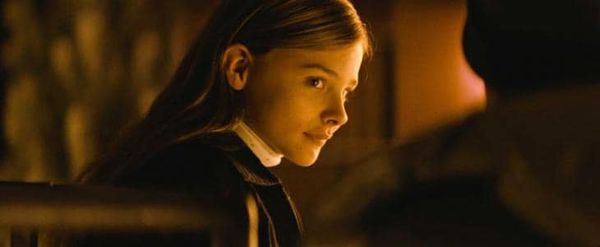Eye For Film >> Movies >> Let Me In (2010) Film Review
Let Me In
Reviewed by: Anton Bitel

The year was 2008 and the world of horror was changing. Tomas Alfredson's Let The Right One In (Låt Den Rätte Komma In) came out, based on the novel of the same name by John Ajvide Lindqvist. Delicate, melancholic, oblique and cool in the most literal sense of the word, it was one of those rare genre titles that crosses over from the charnelhouse to the arthouse. It was also the film that brought the vampire back from the undead at a time when its zombie siblings were reaching their cinematic saturation point.
In the same year, director Matt Reeves - who like Alfredson started out as a director of comedies - unleashed Cloverfield, bringing a new shakicam-vérité perspective to the monster movie and broadening its viewership with a highly successful viral marketing campaign. These were two groundbreaking films which could not be more different from each other.

In a decade where Hollywood has been obsessed with reinventing, reimagining and upgrading, an American remake of Alfredson's film seemed inevitable - although even the merest rumour of such a thing was met with fangs-out derision from the film's legion of devotees. When news filtered down that there would indeed be a remake – in fact a joint UK/US remake, this being the first Hammer production in 30 years – and that Reeves would be at the helm, there were cries of sacrilege (and worse) all over the blogosphere. How could a film so rooted in stillness and distance be helmed by a director whose last feature had sickened a proportion of its audience less with the horrific content of its narrative than with the vertiginous mobility of its handheld camera?
Even worse, Lindqvist's original title, with its hip reference to a Morrissey song, was being changed to the altogether blander Let Me In (also the title of the translated novel in America), with its imperative mood now sounding like a desperate plea for recognition from fans who might well prefer to stick with the cherished original.
Worried by so much negative online buzz before a single frame of their film had been shot, Hammer began some damage limitation, claiming that it had been interested in Lindqvist's novel before it was ever adapted by Alfredson, and suggesting that it would be going back to source for its adaptation. Anyone, however, who sees Hammer's finished product will quickly realise that this is much more a film based on the film than a film based on the book.
In Lindqvist's novel, Oskar's new neighbour Eli, though appearing to be a girl, was, in fact, a boy who had long ago been castrated. In Alfredson's film, a single image alludes obscurely to this backstory, while in Reeves' film, there is not even this visual hint, so that when his Abby (Chloë Grace Moretz) asks her neighbour Owen (Kodi Smit-McPhee) "Would you still like me even if I wasn't a girl?", there is no reason for the viewer to imagine that she is referring to anything other than her inhuman status.
Similarly, in adapting his own novel for the screen, Lindqvist suppressed the detail that Eli's guardian Håkan was an adult paedophile when he first met his young ward, so that any viewer unfamiliar with the book might reasonably suppose that he was himself a boy of roughly Oskar's age when he first met Eli. Reeves picks up this hint and seems to confirm it with an old black-and-white photograph of Abby standing besides a young boy in spectacles. Much, after all, is made of the old cracked glasses worn by her now ageing guardian (Richard Jenkins).
Other changes made by Reeves hardly bring us closer to the novel. His Owen no longer seems to be obsessed with true crime, but is more voyeuristic than Oskar – and it is his mother (Cara Buono) rather than his unseen father who is the alcoholic. The location is shifted from the Stockholm suburbs to a wintry Los Alamos, New Mexico, although the Cold War setting remains (with some well-chosen Reagan soundbites on the topic of evil heard in the background). The chronology is shuffled about and a new policeman character (Elias Koteas) is brought in, convincingly framing the story as a mystery – and there is greater suspense in the scenes where Abby's 'father' tries to kill for her.
Less successful is the hoary, hackneyed attempt to shoehorn in Romeo And Juliet (which Owen is studying in class) as a subtext for his and Abby's young love, as though Shakespeare's tragedy has any real light to cast on this very different affair. And while viewers will welcome the absence from Reeves' film of the CG cats that so disrupted Alfredson's painstakingly achieved naturalism, the J-horror judder with which Reeves invests Abby's climbing and leaping motions has a similarly jarring effect that risks taking viewers out of the film's calm psychodrama and into something altogether more generic.
Otherwise, Let Me In is strikingly similar to Alfredson's film. The performances are all suitably subdued and slightly ethereal. Greig Fraser's cinematography favours the still, long shot and tends to present adult characters out of focus or out of the frame altogether. Indeed, some scenes, such as the climactic pool sequence, follow very closely the idiosyncratic perspectives of Alfredson's film. So, seen in its own terms, Let Me In is a quality film, subtle, sinuous and suggestive – but the problem is that, as a remake, it can never really be seen in its own terms.
It has nearly everything that filmgoers loved about Alfredson's Swedish original – except the originality. It does, however, establish Reeves as more than just a passing talent – and if you somehow managed to miss 2008's Let The Right One In, his film might just make 2010 seem another game-changing year in the annals of horror.
Reviewed on: 12 Oct 2010


















